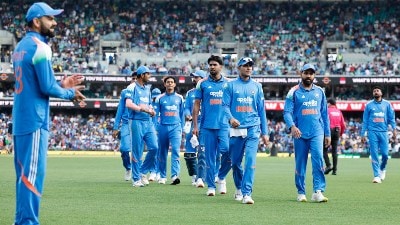Dark celebrations
As I watched the fireworks light up the dark Durban sky from the rooftop of the glitzy Hilton Hotel, there was more than one reason to be ...

As I watched the fireworks light up the dark Durban sky from the rooftop of the glitzy Hilton Hotel, there was more than one reason to be nostalgic. It was the day I flew into Durban on a short visit. The occasion on the rooftop was the celebration of a TV show that successfully completed its one year on the South African Broadcasting Corporation channel. It is called Eastern Mosaic8217; and caters to the Indian population in South Africa. Silken churidars and embroidered sarees swished around me, interweaving with low necklines and skimpy skirts.
This is Durban. A name that evokes the name of the Mahatma. This is where the barrister M.K. Gandhi evolved into Mahatma Gandhi. The juxtaposition of the austere elegance that the Mahatma represents with the indulgent opulence of TV glamour made me strangely uneasy. Liquor flowed in the name of the TV shown and Indian sweets and snacks accompanied it in the name of Diwali.
This is one kind of celebration. The next day afternoon I could see the other kind. It is Chatsworth, a predominantly Indian settlement. A Diwali celebration is on. On a small stage decorated with cheap chiffon sarees, small children dance to the lilting tunes of Hindi film songs. Outside unusually strong winds try their strength on the fragile tent. Though apartheid is officially over, the pockmarks of the erstwhile segregation cannot be wiped out easily. So Indians live in their undignified houses. We peep into some of the houses. They are tiny two-room apartments with suffocating interiors and unplastered ceilings. It is only the rich Indians and rich Africans who have gained from the transition to freedom. Indians in Chatsworth continue to live in deprivation.
On the small stage, a hysterical youth goes on with an unintelligible and seemingly unstoppable announcement. The audience is a mix of blacks and Indians. Most of the men reek of liquor. Though it is late afternoon, past lunchtime, the entertainment goes on. Children go to another tent and help themselves to chicken curry and rice. They huddle on the floor and enjoy their special Diwali meal. Every meal is evidently not like this.
As if pre-planned, the announcer gives way to another young man who resembles a textbook revolutionary in exile. He has fiery eyes, skimpy beard and an impatient expression. He is a candidate for the forthcoming municipal election. He makes an inspired speech. The municipality, he alleges, is insensitive to their plight. So they have to fight, he says. The municipality has served an eviction notice on the residents as they have failed to pay their rent and taxes. They don8217;t have to pay, he argues, as the municipality has not provided them water or other services. Unemployment doles have not been paid for months. As more sparks fly in the speech, a few among the audience listen and encourage him. And the children enjoy their chicken and rice in unhygienic surroundings.
Will their children too have to eat this humble pie? Will a new candidate, sensitive to their needs, bring light in their lives? Are they acquiring the right education and skills to make themselves employable? They are the descendants of the sugarcane farm workers who arrived on the African coast more than a century ago. Knowing full well that their life will continue on the fringes, they cheer the candidate-hopeful and pledge their support. They want an illusion to comfort them.
I am reminded of India8217;s villages and slums. These scenes are commonplace there. I realise that Gandhi8217;s dream of a life of dignity remains a dream, in India as well as in South Africa. Deprivation is the antithesis of human rights and dignity. The ending of poverty and ignorance and disease and inequality of opportunity will continue to vex these people for a few more decades to come. I understand, sadly, that the economic development of a resurgent South Africa is bypassing them.
- 01
- 02
- 03
- 04
- 05































